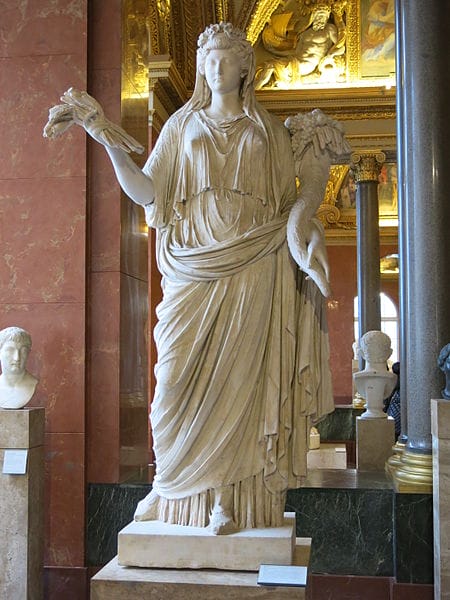Livia Drusilla, also known as Julia Augusta, was one of the most powerful women in ancient Rome and the wife of Emperor Augustus. She was born in 58 BC and lived until 29 AD, during which time she played a significant role in shaping the Roman Empire. Livia’s legacy is a complex one, as she was both praised for her political savvy and criticized for her alleged role in the deaths of several members of her family.
Livia’s early life was marked by tragedy, as her father was exiled and her mother committed suicide. Despite these hardships, she went on to marry Tiberius Nero, a prominent Roman politician. After the death of her first husband, Livia married Augustus and became the first Roman Empress. She was a skilled politician and advisor to her husband and was known for her intelligence and strategic thinking.
However, Livia’s reputation has been tarnished by accusations that she was involved in the deaths of several members of her family, including her husband’s nephew Marcellus, and her own son Drusus. While there is little concrete evidence to support these claims, they have persisted throughout history and have contributed to Livia’s controversial legacy.
Early Life and Marriage to Augustus
Livia Drusilla, born in 58 BC, was the daughter of Marcus Livius Drusus Claudianus, a prominent Roman politician. Her family was wealthy and influential, and Livia received an excellent education. She was trained in rhetoric, literature, and philosophy, which were considered essential for a noblewoman in ancient Rome.
At the age of 15, Livia married Tiberius Claudius Nero, a man twice her age and already a father. Together, they had a son named Tiberius, who would later become Emperor of Rome. However, in 38 BC, Livia’s life took a dramatic turn when she met Octavian, the future Emperor Augustus.
Octavian was immediately smitten with Livia and convinced her to divorce her husband and marry him instead. This caused a scandal in Rome, as divorce was frowned upon, especially for women. However, Octavian was determined to have Livia as his wife and promised to make her his empress.
The marriage between Livia and Augustus was a political alliance that helped to solidify his power. They had no children together, but Livia became a beloved figure in Rome, known for her intelligence, beauty, and grace. Despite their happy marriage, Livia was often the subject of controversy and rumors, as she was seen as a powerful and influential woman in a society that did not always value female leadership.
Influence and Power
Livia Drusilla was a powerful figure in Roman politics during her husband Augustus’s reign. She was known for her intelligence and political acumen, and Augustus trusted her judgment on many important matters. She was instrumental in helping to secure the succession of her son Tiberius as the next emperor, and she also played a key role in the administration of the empire.
Livia was a skilled diplomat and negotiator, and she often acted as an intermediary between Augustus and other powerful figures in the empire. She was also involved in the establishment of public works and the promotion of Roman culture and traditions.

Religious and Cultural Impact
Livia was also influential in the religious and cultural realm of Roman society. She was a patron of the arts and literature, and she supported the construction of many public buildings, including temples and theaters. Livia also played a significant role in the development of Roman religion. She was a priestess of the cult of Vesta, and she helped to establish the worship of the deified Augustus and his family. She also promoted the cult of the Magna Mater, a popular fertility goddess in Roman religion.
Overall, Livia Drusilla’s influence and power in Roman society were significant and far-reaching. Her legacy as one of the most controversial empresses in Roman history continues to be studied and debated by historians and scholars to this day.
Political Maneuvering
Livia Drusilla was known for her political acumen and her ability to influence her husband, Emperor Augustus, and the Roman Senate. However, her methods were often controversial and raised suspicions among her contemporaries. She was accused of using her position to advance her own family’s interests and of manipulating the emperor to eliminate potential rivals. Her involvement in the exile and execution of her stepson, Agrippa Postumus, fueled rumors of her ruthlessness and ambition.
Livia’s reputation among her contemporaries was mixed. Some praised her intelligence and loyalty to Augustus, while others viewed her with suspicion and fear. Her relationship with Augustus was the subject of much speculation, with some suggesting that she had poisoned his previous wife, Scribonia, to clear the way for their marriage. Her role in the Roman court was also a source of controversy, with some accusing her of wielding too much power and influence.
Livia Drusilla’s political maneuvering and influence helped shape the Roman Empire during a crucial period of its development. While her reputation may be controversial, there is no denying the impact she had on the ancient world.
Exile and Livia’s Demise
In her final years, Livia Drusilla was exiled to Pandateria Island, where she lived in seclusion until her death. The exact cause of her death is unknown, but it is believed that she died of natural causes at the age of 86. Some historians speculate that she may have been poisoned by her grandson, Caligula, who was rumored to have been angry with her for opposing his ascension to the throne.

Livia Drusilla was posthumously recognized for her contributions to the Roman Empire. She was deified by her son, the Emperor Tiberius, and was honored with the title of Augusta. Her legacy also lived on through her descendants, including her grandson Claudius, who became emperor after Caligula’s assassination.
Livia Drusilla’s political savvy and influence over her family members have made her one of the most intriguing figures in Roman history. While her methods may have been controversial, there is no denying the impact she had on the Roman Empire during her lifetime and beyond.
Livia’s Legacy
She left a lasting impact on the Roman Empire. Her influence was felt in politics, culture, and society. Despite being a controversial figure, her legacy is still studied and debated today. Historians have long debated Livia’s role in the Roman Empire. Some view her as a power-hungry schemer who manipulated her husband and son to gain influence. Others see her as a devoted wife and mother who worked tirelessly to ensure the stability of the empire.
Regardless of one’s opinion, it is clear that Livia played a significant role in shaping the Roman Empire. She was a trusted advisor to Augustus and helped him make important decisions. She also played a key role in the education of her son, Tiberius, who would later become emperor.
Depictions in Art and Media
Livia has been depicted in various works of art and media throughout history. In ancient times, she was often portrayed as a powerful and regal figure with elaborate hairstyles and intricate clothing. Later depictions often portrayed her as a cunning and manipulative figure with a cold and calculating demeanor.
In modern times, Livia has been the subject of numerous books, films, and television shows. These depictions often vary widely in their portrayal of her character and motives. Some portray her as a sympathetic figure who struggled to balance her personal ambitions with her duty to the empire. Others depict her as a ruthless and calculating figure who would stop at nothing to maintain her power.
Overall, Livia Drusilla remains a fascinating and complex figure in Roman history. Her influence on the empire can still be felt today, and her story continues to captivate scholars and enthusiasts alike.
People Also Ask:
What was Livia Drusilla famous for?
Livia Drusilla was an enormously powerful woman in the imperial Roman government. In 38 B.C.E., she divorced her first husband, by whom she bore two sons, and married her lover Octavian, later the emperor Augustus.
What happened to Livia after Augustus died?
After the death of Augustus, she was adopted in his will and assumed the name Julia Augusta; she played a major role in the cult of the deified Augustus. Livia’s power and ambition proved embarrassing to Tiberius after his accession.
How is Livia portrayed?
As well as a perfect Roman woman, Livia was also portrayed in the statue as a mother: “ Livia’s presence explained by her pivotal role as wife, daughter, priestess of the deified Augustus, and Augusta. She was the linchpin that held the family together.”
What did Livia do?
Livia Drusilla was Caesar Augustus’s devoted and influential wife who counseled him on affairs of state and who, in her efforts to secure the imperial succession for her son Tiberius, was reputed to have caused the deaths of many of his rivals, including Marcus Claudius Marcellus.
How powerful was Livia Drusilla?
Livia Drusilla was arguably one of the most powerful women in the early Roman Empire, beloved by the people but hated by the enemies of the first Emperor Augustus. She has often been described as beautiful and loyal, yet at the same time, constantly scheming and deceitful.
What is the legacy of Livia Drusilla?
Livia Drusilla became a national symbol of female power and influence. Her name was religiously invoked for oaths and ceremonies, and her villa was preserved as she had left it with frescoes depicting a garden set in the mountains. Today, tourists can see her frescoes in the National Museum of Rome.
Hello, my name is Vladimir, and I am a part of the Roman-empire writing team.
I am a historian, and history is an integral part of my life.
To be honest, while I was in school, I didn’t like history so how did I end up studying it? Well, for that, I have to thank history-based strategy PC games. Thank you so much, Europa Universalis IV, and thank you, Medieval Total War.
Since games made me fall in love with history, I completed bachelor studies at Filozofski Fakultet Niš, a part of the University of Niš. My bachelor’s thesis was about Julis Caesar. Soon, I completed my master’s studies at the same university.
For years now, I have been working as a teacher in a local elementary school, but my passion for writing isn’t fulfilled, so I decided to pursue that ambition online. There were a few gigs, but most of them were not history-related.
Then I stumbled upon roman-empire.com, and now I am a part of something bigger. No, I am not a part of the ancient Roman Empire but of a creative writing team where I have the freedom to write about whatever I want. Yes, even about Star Wars. Stay tuned for that.
Anyway, I am better at writing about Rome than writing about me. But if you would like to contact me for any reason, you can do it at [email protected]. Except for negative reviews, of course. 😀
Kind regards,
Vladimir
